MARVIN GAYE / “Calypso Blues”
I’ve heard only a small percentage of the Nat ‘King’ Cole catalog, but I wouldn’t be surprised if “Calypso Blues” is the oddest record Cole ever recorded. The lyrics, which Cole wrote (along with co-composer Don George), paint the portrait of a poor Trinidadian who came to America to find his fortune and finding nothing of the sort, spends his days dreaming of the ‘fine calypso woman’ he left behind. 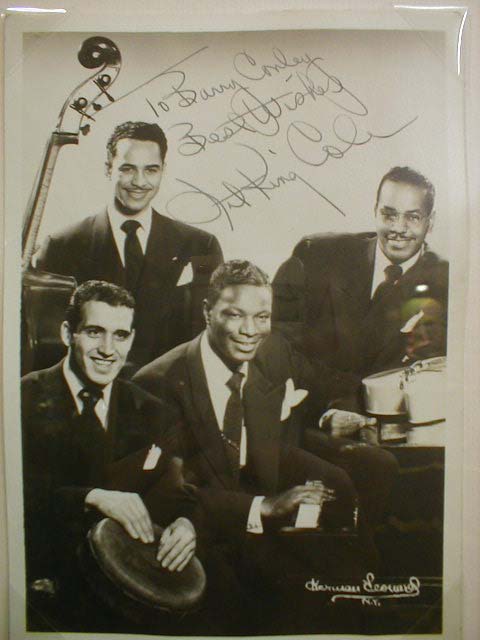
The lyrics are somehow both comical and despairing (“Me throat she sick from necktie / Me feet hurt from shoes / Me pocket full of empty / I got Calypso blues”); Cole’s tone is equally anachronistic, striking the perfect balance between indignation and detachment. Despite being accompanied by no more than a lone bongo drummer, Cole’s vocal phrasing lends to his big city blues at least a suggestion of the uptempo lilt of Trinidadian steel drums. One note: The Nat Cole version in the jukebox isn’t the original; it’s a cover as well. The original, which is only available in a dull-sounding mono mix, dates back to the Fifties. The sound quality of Nat’s 1961 rerecording (in stereo) is much better. More importantly, Nat nailed the vocals and the bongo player (who, on the original, plays like he was running late for another session) lets the groove breath as Nat leads the way.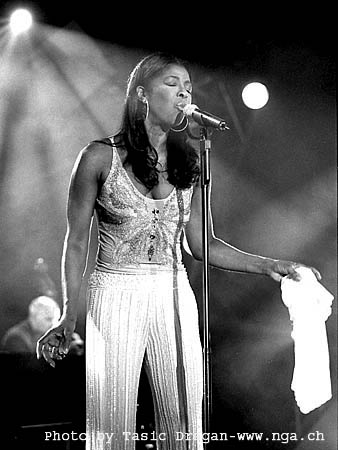
On Natalie Cole’s 1993 album Take A Look (the follow-up to Unforgettable), Natalie takes on “Calypso Blues,” and with surprisingly happy results. A say ‘surprisingly’ because Nat’s version is both arranged and performed in such a singular fashion, that I wouldn’t have thought there was anything different another singer could do with the song and still sound good. Natalie’s approach was to change the tone completely: instead of sounding like an outright blues, Natalie’s version sounds like a reference to someone else’s blues—meaning, it isn’t itself a blues, it’s a song about the blues. The groove is sweeter, smoother and more full (it’s an entire band, not just a drummer); there’s even a joyful, carnival-esque break. At the beginning, it sounds like Natalie is merely reciting something she may have overheard her Dad talk about with his friends (although still in the first person—she doesn’t change the pronouns), but by the end of the song, it almost sounds like she herself is the “fine calypso woman” in question. “I’m going back to my baby” she ad-libs into the fadeout, “I’m going back, I’m going back, I’m going back.”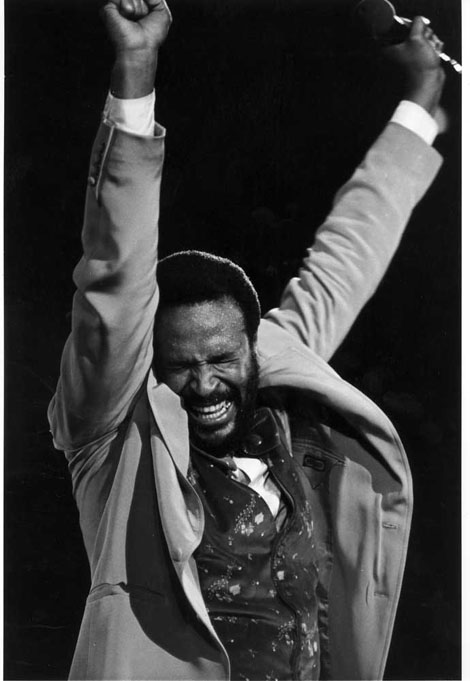
The feature version is Marvin Gaye’s, which Marvin recorded as part of his 1965 album A Tribute To The Great Nat King Cole. The most striking thing about Marvin’s version is how much the then-young pop star (he was 26) sounds like his idol. In fact, if you listen to only the first few words of each version, it’s isn’t immediately apparent which is which. The major difference is the subtle, but certainly audible, bitterness that Marvin’s voice carries. I’m not sure what Marvin was angry about that day in the studio, but he was angry about something. At times (“my pocket full of empty”), Marvin seems to be almost spitting out Cole’s lyrics. And what’s with the bizarre, almost-animalistic ‘AAGH-YAAH!’ at the end of each verse? One reviewer at Amazon.com called Marvin’s “Calypso Blues” performance “soulful, animated and pugnacious,” and given that ‘pugnacious’ means ‘belligerent’ or ‘combative,’ I think the reviewer has a point.
—Mtume ya Salaam
Tracks:
“Calypso Blues” - Nat ‘King’ Cole - From The Nat King Cole Story (1961, Capitol)
“Calypso Blues” – Natalie Cole – From Take A Look (1993, Elektra)
“Calypso Blues” – Marvin Gaye – From A Tribute To The Great Nat King Cole (1965, Motown)
Long live the King!
Mtume, Nat 'King' Cole is an unacknowledged godhead of American popular music. Only Louis Armstrong surpasses him as the most important vocalist in American popular music. Nobody else comes close. Pops inches ahead of Nat, not only because Pops preceded Nat, and thus helped set the stage for Nat, but also because of Pops' prowess as a trumpet player and the fact that he was the first major soloist of recorded jazz history. On the other hand, Nat 'King' Cole had a significantly greater impact worldwide as a vocalist and set the tone for nearly every post-World War II popular male vocalist. 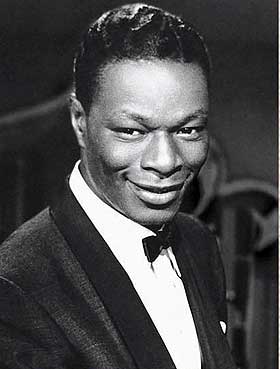
Why doesn’t Nat 'King' Cole receive more accolades? I could be glib (or flip) and say: Frank Sinatra. I could play the Negro conspiracy card and say that it was because he was a BLACK Black man in racist America, coming up through the height of Jim Crow. I could be a music critic and point out that he was not a major innovator nor composer. It could be a multiplicity of reasons, but the fact is, when we talk about the major figures of Black music, we don’t usually list Nat 'King' Cole in the top 10.
Nat 'King' Cole started out as a jazz pianist, became a jazz singer, and then became the ultimate crooner of popular music—can anyone say: “Ramblin’ Rose,” “Those Lazy-Hazy-Crazy Days of Summer,” “Mona Lisa,” “Sweet Lorraine,” etc. etc. etc. ad infinitum?
Much like his singing style, his influence was huge but extremely subtle. There are people who were influenced by Nat 'King' Cole whom you might never expect. Two quick examples.
Hugh Masekela. I remember interviewing bra Hugh and he talking about how in South Africa they thought of the music coming from the USA as American music and thought that it was white people making the music. It never occurred to them to think of it as Black music. I said: What!!?? And Hugh said: yeah, man. You see the authorities would blank out the original cover photographs and put white people on the cover. I, of course, understood what he meant because in the Fifties I remember seeing white models used on the cover of Duke Ellington and Miles Davis recordings. Indeed, it was Miles who intentionally led a protest against having white women on the cover of his albums, hence his wife Francis Davis, and his wife Cecily Tyson… you get the picture? And then Hugh gives the example of one of his favorites: Nat 'King' Cole. I laughed my ass off. How in the world could anyone think Nat 'King' Cole was white?
Jerry Butler. Yeah, Jerry Butler. Nat 'King' Cole was Jerry’s idol. As Jerry reminisced about his high school prom, and taking his date there, and really, really enjoying the show because the man who most influence his style played for their prom, Jerry asked me to guess who it was. I didn’t know. It was Nat 'King' Cole.
Also, and in the midst of all the bullshit that passes for entertainment on television today, most of us do not know that Nat 'King' Cole was the first black person to host a major network television show as well as the first to have a nationally broadcast music program on network radio. Despite it’s popularity with the viewing public, Nat’s television program folded after a little over a year because in the Fifties advertisers refused to support a program hosted and produced by a Black man, or as Nat coolly noted: Madison Avenue is afraid of the dark.
Long before white America led a media coup to usurp the title from Nat 'King' Cole and award it to Elvis Presley, long before then, the whole world knew who the real 'King' was and also knew that he had genuinely earned the honorific title of 'King.' He earned it as a first-class bebop pianist and musician. He earned it as a jazz vocalist. He earned it as a shaper of popular music. I would not be surprised if the word 'crooner' was invented to describe what Nat 'King' Cole accomplished.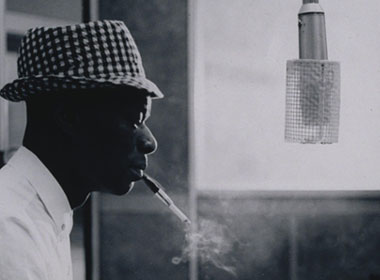
The crooning style of singing was made possible by amplification and microphones. The crooner didn’t shout, he (and the term usually refers to males, although there were also female crooners), he whispered. The voice caressed rather than assaulted the listener’s ear. So here comes coal-black Nathaniel Adams Coles, born in Montgomery, Alabama around 1917 (there are questions about the accuracy of the date), and bred in Bronzeville, a section of Chicago, Illinois. He’s a graduate of that famous factory for jazz musicians, DuSable High School under the mighty direction of Walter Dyett. Nat became a devotee of jazz piano but was also classically trained. He went on to introduce the hip new combo format: piano, guitar and bass. Occasionally, Nat added a latin percussionist, usually on bongos. By the mid-Fifties he is credited with establishing Capitol Records, whose Los Angeles/Hollywood studios were sometimes referred to as the house that Nat built.
To give you an idea of how important he was as a recording artist, the Nat 'King' Cole Trio output just on Capitol records comes to approximately 349 songs, and that’s not counting his big band recordings, the “with strings” recordings, the guest appearances, etc. etc. The man was a monster of popular music.
But beyond all the show business accomplishments, he was also a supporter of his people. He fought segregation tooth and nail. Literally. Once, in 1956, he was assaulted on stage in Birmingham by members of the White Citizen’s Council. Even though injured, he insisted on completing the show and then vowed never to perform in the segregated South again. He constantly championed other musicians and fought for equality of opportunity and remuneration.
Nat 'King' Cole was top of the line. First rate. We should never forget him. Never overlook him. Long live the King—the real King of American music.
—Kalamu ya Salaam
This entry was posted on Sunday, February 19th, 2006 at 1:05 am and is filed under Cover. You can follow any responses to this entry through the RSS 2.0 feed. You can leave a response, or trackback from your own site.
2 Responses to “MARVIN GAYE / “Calypso Blues””
February 19th, 2006 at 10:39 am
Thank you so much for the historical perspective, Brother Kalamu! I have always loved Nat King Cole’s sound and knew of his vanguard status in broadcast media, but some of the other profound moves he’d made in recordings and on stage. I am always enriched by visiting this site!
February 20th, 2006 at 9:47 am
Just a thought: Was that Eddie “Bongo” Brown playing against Marvin’s singing in Calypso Blues? Wondered who encouraged this album by Marvin at Motown? Lots of questions arise while listening. Thanks for the music lesson guys!!!!!
Leave a Reply
| top |